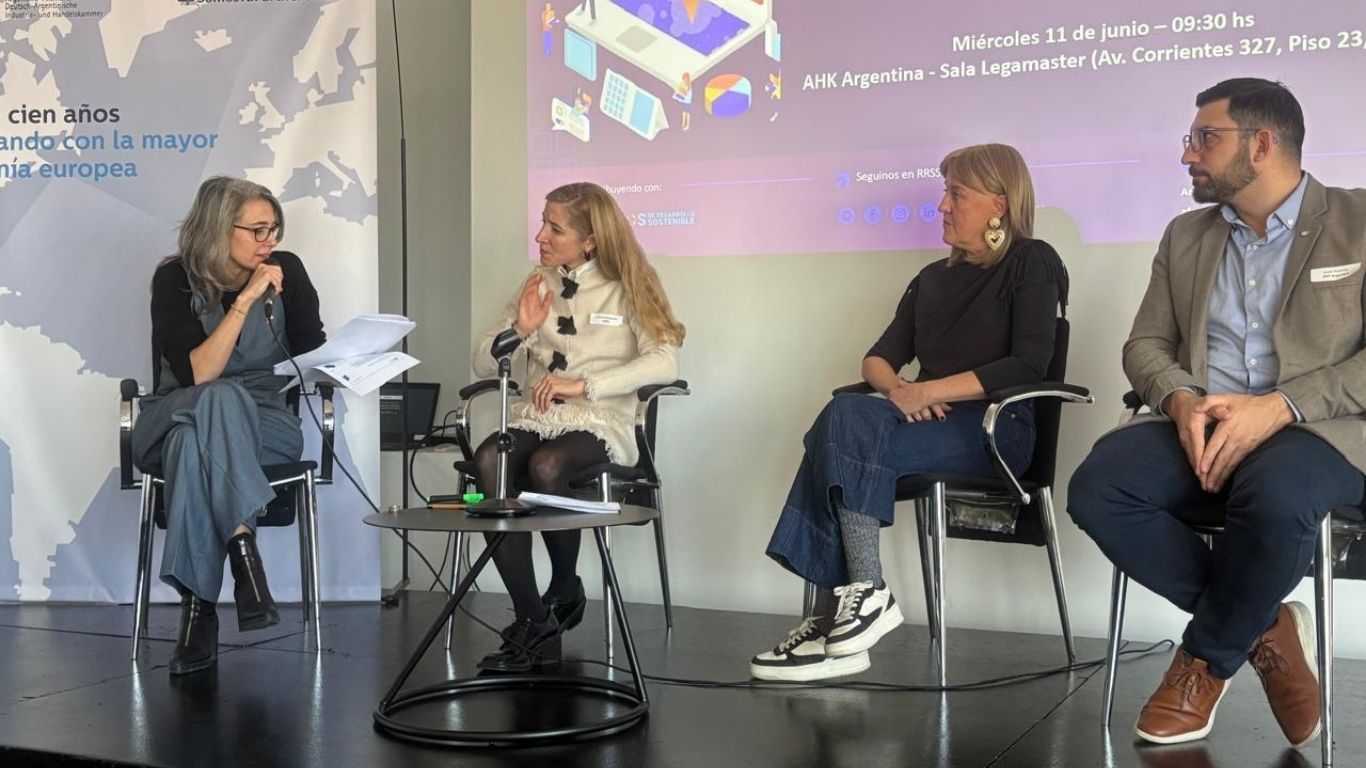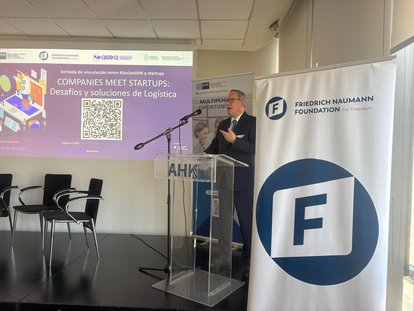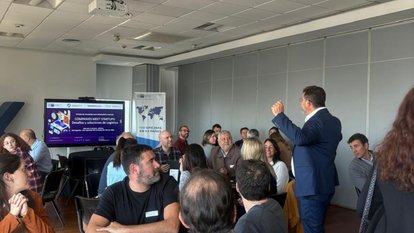Argentina
Argentina in Transformation: Cooperation and Development

Panel discussion on the future of the entrepreneurial ecosystem in Argentina
© FNF ArgentinaThe Argentine economy is going through a moment of structural redefinition. Since the new administration, the country has made progress in key areas such as fiscal consolidation, the elimination of multiple distorting regulations and relative price transparency. However, structural reforms are still necessary to face the macroeconomic situation and the main challenges to be addressed, such as accumulated inflation, recession in economic activity and limited productive credit.
In this scenario, understanding the situation of the private sector -particularly entrepreneurs and companies active in the country- is essential to draw an action map that links economic policy with the real needs of the productive ecosystem. From the Friedrich Naumann Foundation for Freedom, in collaboration with the Argentine Association of Entrepreneurs (ASEA), the German Chamber of Commerce (AHK) and the National Undersecretariat of Economy, we carried out a joint initiative based on data collected in research and through the promotion of dialogue that allowed us to identify critical points and opportunities for improvement.
Economic Recovery and Persistent Constraints
Since late 2023, the national government has promoted a series of reforms aimed at stabilizing public finances, deregulating strategic sectors and generating a more favorable environment for investment. These measures were positively valued by some economic actors, especially because of their long-term vocation. However, their immediate impact on small and medium-sized enterprises is still limited.
The First National Survey of Entrepreneurs that we prepared together with ASEA reveals that access to financing continues to be a central obstacle. More than 77% of entrepreneurs finance their activities with their own resources or family loans, and almost 80% find it difficult or very difficult to access bank loans or government programs. High interest rates, exchange rate instability and the complexity of requirements limit the expansion of projects with high growth potential.
Added to this is the difficulty in incorporating talent. A total of 61.7% of entrepreneurs point out that hiring personnel due to high labor costs and legal insecurity is a problem. There is also a significant gap in terms of bureaucracy and paperwork, where more than 60% of those surveyed consider that the processes before the State are complex, slow and uncoordinated.

Dr. Hans-Dieter Holtzmann gave the welcoming remarks at the “Companies Meet Startups” event.
© FNF ArgentinaThe Entrepreneurial Ecosystem as a Driver of Change
Argentina has a vibrant, diverse and resilient entrepreneurial ecosystem. In 2023, more than 239,000 ventures were registered, generating employment for more than 880,000 people. The country leads the region in number of unicorns and in conditions for dynamic entrepreneurship, according to the ICSEd-Prodem index.
The survey identified that more than 60% of the enterprises are in expansion or active sales stages. Even in a context of macroeconomic volatility, entrepreneurs show an optimistic attitude where more than half plan to increase their investment in the next 12 months.
But this potential needs a more conducive environment to become an engine of sustained growth. The main demands expressed by the ecosystem include a differentiated tax policy for new ventures, administrative simplification, greater access to financing and active policies for insertion in value chains and exports.
Perspective of the German Business Sector in Argentina
The survey conducted by the German Chamber of Commerce (AHK Argentina) allows us to understand how German companies evaluate the current context. Although there is a positive assessment of the reforms aimed at macroeconomic stability and market opening, German businessmen express a mostly cautious attitude regarding the short term.
According to the AHK survey, only 25% of German companies consider the economic situation to be currently good or very good, although more than 70% expect improvements in the coming years if the reforms are sustained. 88% plan to maintain or increase their business activity in the short term. 88% plan to maintain or increase their investment in the country, revealing a vote of confidence in the long term despite the current difficulties.
Among the main challenges identified were exchange rate volatility, fiscal pressure and regulatory uncertainty. At the same time, German companies highlight the quality of Argentine talent, cost competitiveness and market potential as key factors to continue betting on the country.
Interest in partnering with local start-ups is also growing, especially in areas such as industrial automation, energy efficiency, circular economy and technologies applied to production. This strategic approach seeks not only to expand the supplier network, but also to integrate into the local innovation ecosystem.

Exchange meeting between entrepreneurs, experts and representatives of AHK and FNF
© FNF ArgentinaCooperation between politics and economics
the context of structural reform, dialogue between the public and private sectors is essential. The collaboration between FNF, ASEA, AHK and the Undersecretariat of Economy responds precisely to this need. Bringing together the voices of the state, entrepreneurs and locally active foreign companies in order to build a shared roadmap.
Cooperation between politics and economics is not only desirable, but necessary. Public policies that are more aligned with the realities of the productive sector are needed, and in turn, economic actors committed to a culture of compliance, innovation and openness.
The surveys and linkage spaces that we promote seek to break the logic of isolated analysis and generate evidence for the design of effective public policies. At the same time, they allow us to identify points of consensus that can become concrete opportunities for collaboration.
Building Concrete Bridges between Companies
One of the main objectives of the results presentation event, held on June 11 at the headquarters of the German Chamber of Commerce, was to build bridges between German and Argentine companies, especially start-ups and SMEs. Cooperation at the business level is key to accelerate innovation processes, open commercialization channels, and promote the transfer of knowledge and technology.
In this sense, the results of the surveys can serve as input for medium-sized German companies to detect opportunities for collaboration with Argentine entrepreneurs in sectors such as logistics, renewable energies, agro-industrial technologies or digital solutions. In turn, this type of linkages can offer Argentine start-ups a concrete path to internationalization and scalability.
Synergy as a Strategy for the Future
Argentina has the potential to become a regional hub for innovation and entrepreneurship, but this path requires overcoming structural obstacles at both the macroeconomic and micro-entrepreneurial levels. The key lies in combining fundamental reforms with specific policies that promote a competitive, inclusive and sustainable environment for private sector development.
In this process, the role of international cooperation acquires strategic relevance. The current cycle of transformation based on principles of stabilization, deregulation and economic openness offers a window of opportunity for European actors, especially Germany, to strengthen their presence and integration in Latin America. Providing not only investment and technology, but also regulatory frameworks, institutional experiences and collaboration networks, can have a concrete impact on the evolution of the Argentine entrepreneurial ecosystem.
The exchange between medium-sized German companies and Argentine ventures opens up new possibilities in key sectors such as logistics, renewable energies, agribusiness and digitalization. Initiatives aimed at joint financing, technical assistance, talent training and access to international markets contribute to building a deeper economic bond, based on shared values such as economic freedom, innovation and social responsibility.
Promoting freer, more open and prosperous societies requires strengthening those who undertake, invest and generate employment in adverse contexts. Liberalism, understood as a commitment to individual autonomy, institutional order and cooperation, finds in the link between politics, associations and business a key channel to translate into action and concrete progress. Wherever opportunities for entrepreneurship and association are multiplied, the margins of freedom are also expanded.

